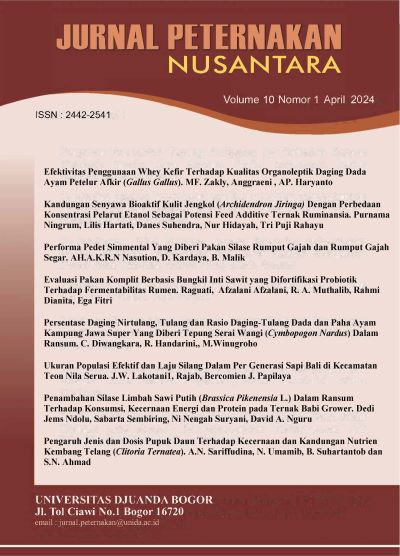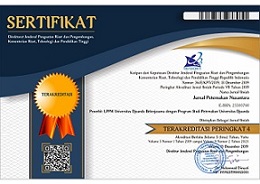EFFECTIVE POPULATION AND INBREEDING RATE PER GENERATION OF BALI CATTLE IN TEON NILA SERUA DISTRICT
UKURAN POPULASI EFEKTIF DAN LAJU SILANG DALAM PER GENERASI SAPI BALI DI KECAMATAN TEON NILA SERUA
DOI:
https://doi.org/10.30997/jpn.v10i1.11151Keywords:
population effective rate, inbreeding rate per generation, Bali cattleAbstract
The aim of the study was to determine the effective population size and cross-over per generation of Bali cattle in Teon Nila Serua District, Central Maluku Regency. The method used in this study was a survey method by interviewing 10 respondents in each sample village which were randomly selected (random sampling), and direct observation in the field. The observed variables included population structure, actual population, effective population size, and cross-over rate per generation. The results showed that the effective population size of Bali cattle in TNS District was dominated by adult cows as breeding stock to maintain and increase the population with an inbreeding rate per generation of Bali cattle in Teon Nila Serua District which was still low indicating that the condition of the Bali cattle population was still in the status of safe to develop
Downloads
References
Agus, A., & Mastuti Widi, T. S. (2018). Current situation and future prospects for beef cattle production in Indonesia—A review. Asian-Australasian Journal of Animal Sciences, 31(7), 976–983. https://doi.org/10.5713/ajas.18.0233
Arifin, J., Komar, S. B., Setyowati, E. Y., Yunasaf, U., Anang, A., Indrijani, H., & Sulasmi -. (2015). Sebaran Gen, Keseimbangan Populasi dan Ukuran Populasi Efektif Sapi Pasundan Pasca Migrasi di Majalengka. Jurnal Ilmu Ternak Universitas Padjadjaran, 15(2), 101-107. https://doi.org/10.24198/jit.v15i2.9518
Carolino, N., & Gama, L. T. (2008). Inbreeding depression on beef cattle traits: Estimates, linearity of effects and heterogeneity among sire-families. Genetics, Selection, Evolution: GSE, 40(5), 511–527. https://doi.org/10.1186/1297-9686-40-5-511
Chhotaray, S., Panigrahi, M., Pal, D., Ahmad, S. F., Bhanuprakash, V., Kumar, H., Parida, S., Bhushan, B., Gaur, G. K., Mishra, B. P., & Singh, R. K. (2021). Genome-wide estimation of inbreeding coefficient, effective population size and haplotype blocks in Vrindavani crossbred cattle strain of India. Biological Rhythm Research, 52(5), 666–679. https://doi.org/10.1080/09291016.2019.1600266
Dezetter, C., Leclerc, H., Mattalia, S., Barbat, A., Boichard, D., & Ducrocq, V. (2015). Inbreeding and crossbreeding parameters for production and fertility traits in Holstein, Montbéliarde, and Normande cows. Journal of Dairy Science, 98(7), 4904–4913.
Doekes, H. P., Bijma, P., & Windig, J. J. (2021). How Depressing Is Inbreeding? A Meta-Analysis of 30 Years of Research on the Effects of Inbreeding in Livestock. Genes, 12(6), 926-947. https://doi.org/10.3390/genes12060926
García-Ruiz, A., Martínez-Marín, G. J., Cortes-Hernández, J., & Ruiz-López, F. de J. (2021). Inbreeding levels and their effects on phenotypic expression in Holstein cattle. Revista Mexicana de Ciencias Pecuarias, 12(4), 996–1007.
Hall, S. J. G. (2016). Effective population sizes in cattle, sheep, horses, pigs and goats estimated from census and herdbook data. Animal, 10(11), 1778–1785. https://doi.org/10.1017/S1751731116000914
Hasman, H., Baco, S., & Zulkarnaim, Z. (2021). Dynamics and Population Structure of Bali Cattle Partnerships Maiwa Breeding Center (MBC) in Barru Regency. Hasanuddin Journal of Animal Science (HAJAS), 3(1), 26–34.
Hubeis, M. (2020). Strategi pengembangan sapi potong di wilayah pengembangan Sapi Bali Kabupaten Barru. MANAJEMEN IKM: Jurnal Manajemen Pengembangan Industri Kecil Menengah, 15(1), 48–61.
Islamiati, F. S., Susari, N. N. W., & Sampurna, I. P. (n.d.). Keragaman dan Korelasi Dimensi Lebar Tubuh Induk Sapi Bali di Pusat Pembibitan Sapi Bali Unggul Gerokgak, Buleleng, Bali. Buletin Veteriner Udayana, 15(1), 68–74.
Kelleher, M. M., Berry, D. P., Kearney, J. F., McParland, S., Buckley, F., & Purfield, D. C. (2017). Inference of population structure of purebred dairy and beef cattle using high-density genotype data. Animal: An International Journal of Animal Bioscience, 11(1), 15–23. https://doi.org/10.1017/S1751731116001099
Leroy, G., Baumung, R., Boettcher, P., Besbes, B., From, T., & Hoffmann, I. (2018). Animal genetic resources diversity and ecosystem services. Global Food Security, 17, 84–91.
Makina, S. O., Muchadeyi, F. C., van Marle-Köster, E., MacNeil, M. D., & Maiwashe, A. (2014). Genetic diversity and population structure among six cattle breeds in South Africa using a whole genome SNP panel. Frontiers in Genetics, 5, 333. https://doi.org/10.3389/fgene.2014.00333
Nascimento, B. M., Wolfe, C. W., Weigel, K. A., & Peñagaricano, F. (2023). Effects of type traits, inbreeding, and production on survival in US Jersey cattle. Journal of Dairy Science, 106(7), 4825–4835. https://doi.org/10.3168/jds.2022-23048
Nomura, T., Honda, T., & Mukai, F. (2001). Inbreeding and effective population size of Japanese Black cattle. Journal of Animal Science, 79(2), 366–370. https://doi.org/10.2527/2001.792366x
Paige, K. N. (2010). The Functional Genomics of Inbreeding Depression: A New Approach to an Old Problem. BioScience, 60(4), 267–277. https://doi.org/10.1525/bio.2010.60.4.5
Paputungan, U., Utiah, W., & Turangan, S. (2022). Kajian keragaman genetik sapi lokal campuran untuk penguatan peternakan sapi potong di Sulawesi Utara. PROSIDING SEMINAR NASIONAL TEKNOLOGI AGRIBISNIS PETERNAKAN (STAP), 9, 331–339. http://jnp.fapet.unsoed.ac.id/index.php/psv/article/view/1628
Pramesti, N. K. L., Berata, I. K., & Kendran, A. A. S. (2020). Profil Hematologi, Kadar Timbal dan Kadmium dalam Darah Sapi Bali yang Rumennya Mengandung Sampah Plastik. Indonesia Medicus Veterinus, 9(4), 526-533.
Rajab, R. (2021). Karakterisasi Warna Bulu Dan Ukuran Tubuh Sapi Bali Jantan Pada Peternakan Rakyat. Jurnal Hutan Pulau-Pulau Kecil, 5(1), 97–106.
Rodríguez-Ramilo, S. T., Elsen, J. M., & Legarra, A. (2019). Inbreeding and effective population size in French dairy sheep: Comparison between genomic and pedigree estimates. Journal of Dairy Science, 102(5), 4227–4237.
Romjali, E. (2018). Program pembibitan sapi potong lokal Indonesia. Wartazoa, 28(4), 190–210.
Said, S., Putra, W. P. B., Anwar, S., Agung, P. P., & Yuhani, H. (2017). Phenotypic, morphometric characterization and population structure of Pasundan cattle at West Java, Indonesia. Biodiversitas Journal of Biological Diversity, 18(4), 1638-1645. https://doi.org/10.13057/biodiv/d180443
Saili, T. (2020). Production and reproduction performances of Bali cattle in Southeast Sulawesi-Indonesia. IOP Conference Series: Earth and Environmental Science, 465(1), 012004. https://iopscience.iop.org/article/10.1088/1755-1315/465/1/012004/meta
Santoso, B., & Prasetiyono, B. W. H. E. (2020). The Regional Analysis of Beef Cattle Farm Development in Semarang Regency. Tropical Animal Science Journal, 43(1), 86-94. https://doi.org/10.5398/tasj.2020.43.1.86
Sari, D. A. P., & Said, S. (2020). Potensi dan performa reproduksi indukan sapi Bali dalam mendukung usaha pembiakan di Stasiun Lapang Sekolah Peternakan Rakyat. Jurnal Ilmu Produksi Dan Teknologi Hasil Peternakan, 8(2), 80–85.
Sohail, M., Izarraras-Gomez, A., & Ortega-Del Vecchyo, D. (2021). Populations, Traits, and Their Spatial Structure in Humans. Genome Biology and Evolution, 13(12), 272-281. https://doi.org/10.1093/gbe/evab272
Souhoka, D. F., Tagueha, A. D., & Rajab, R. (2020). Tingkat Insidensi Pemotongan Sapi Betina Bunting Di Rumah Potong Hewan Kota Ambon. Agrinimal Jurnal Ilmu Ternak Dan Tanaman, 8(1), 44-50. https://doi.org/10.30598/ajitt.2020.8.1.44-50
Srivastava, A. K., Patel, J. B., Ankuya, K. J., Chauhan, H. D., Pawar, M. M., & Gupta, J. P. (2019). Conservation of indigenous cattle breeds. Journal of Animal Research, 9(1), 1–12.
Strucken, E. M., Gebrehiwot, N. Z., Swaminathan, M., Joshi, S., Al Kalaldeh, M., & Gibson, J. P. (2021). Genetic diversity and effective population sizes of thirteen Indian cattle breeds. Genetics Selection Evolution, 53(1), 47-56. https://doi.org/10.1186/s12711-021-00640-3
Sulfiar, A. E. T., Ibrahim, A., Atmoko, B. A., Guntoro, B., & Budisatria, I. G. S. (2022). Estimation of Bali Cattle Population Dynamics in the South Konawe Regency, Southeast Sulawesi. Proceedings of the International Conference on Improving Tropical Animal Production for Food Security (ITAPS), 73–77. https://doi.org/10.2991/absr.k.220309.015
Syaputra, M. A., Umar, S., & Gunawan, A. (2019). Efek Silang Dalam Terhadap Ukuran Tubuh Kerbau Murrah. Jurnal Ilmu dan Teknologi Peternakan Tropis, 6(3), 382-387. https://doi.org/10.33772/jitro.v6i3.7602
Wirth, A., Duda, J., & Distl, O. (2023). Impact of Inbreeding and Ancestral Inbreeding on Longevity Traits in German Brown Cows. Animals, 13(17), 2765-2780. https://doi.org/10.3390/ani13172765
Wutwensa, H. F., Matatula, M. J., Ririmasse, P. M., & Rajab, R. (2022). Pendapatan Usaha Sapi Potong Pola Integrasi Dengan Tanaman Kelapa Di Kecamatan Teon Nila Serua Kabupaten Maluku Tengah. Agrinimal Jurnal Ilmu Ternak Dan Tanaman, 10(2), 96-105. https://doi.org/10.30598/ajitt.2022.10.2.96-105
Downloads
Published
How to Cite
Issue
Section
License
Copyright (c) 2024 Jacob W. Lakotani, Rajab Rajab, Bercomien J. Papilaya

This work is licensed under a Creative Commons Attribution-ShareAlike 4.0 International License.
Authors who publish with Jurnal Peternakan Nusantara agree to the following terms:
- Authors retain copyright and grant the journal right of first publication with the work simultaneously licensed under a Creative Commons Attribution 4.0 International License that allows others to share the work with an acknowledgement of the work's authorship and initial publication in Jurnal Peternakan Nusantara.
- Authors are able to enter into separate, additional contractual arrangements for the non-exclusive distribution of the journal's published version of the work (e.g., post it to an institutional repository or publish it in a book), with an acknowledgement of its initial publication in Jurnal Peternakan Nusantara.
- Authors are permitted and encouraged to post their work online (e.g., in institutional repositories or on their website) prior to and during the submission process, as it can lead to productive exchanges, as well as earlier and greater citation of published work.










